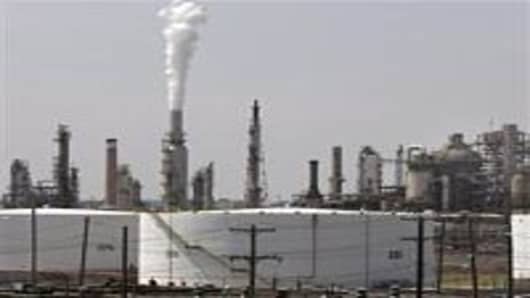Delta Air Line’s much-maligned hope to purchase an East Coast oil refinery hinges on the aid of two important partners: JPMorgan and Big Oil.
In recent weeks, say people familiar with the matter, Delta has been in advanced discussions with ConocoPhillips about the possibility of buying its Trainer, Penn. refinery for more than $100 million. Those talks, which CNBC revealed on April 4, are part of a master plan hatched by Delta management to tamp down soaring jet-fuel costs by bringing the refining process in-house.
How they’ll do that, however, is a complex question.
To make the deal successful, Delta will have to somehow refine its own jet oil at a price level cheaper than what it could get on the open market. Since jet fuel accounts for 36 percent of the airline’s costs and is only rising alongside world crude prices, which were trading at around $119 per barrel Tuesday morning, achieving any sustainable discount would be a win — and yet would not be guaranteed.
Delta shares are down about 6 percent since the news first broke.
Its talks with Conoco are still underway, say the people familiar with the matter, and a deal could either come together or fall apart at any point. But Delta executives are hopeful they can pull the Trainer purchase off, say people familiar with the matter, because they think they have found an innovative way to trim their fuel spending.
Here’s how it could work, according to these people: First, the airline would buy Trainer for between $100 million and $200 million, a price that includes the cost of renovating, or “turning around” the idled plant. From that point forward, the entire refining process would be financed by JP Morgan’s commodities team, who would bankroll everything from the purchase of crude-oil barrels from Nigeria to the shipping of the oil across the ocean and the conversion of the crude into fuel and other products. Delta would then buy the resultant jet fuel from JP Morgan for what amounted to a wholesale price, and JPMorgan would have the subsequent right to sell some of Trainer’s other final products — mostly diesel, but also kerosene and other fluids — on the open market, potentially for a profit.
But there’s a final element: some of those non jet-fuel products would be given to at least two big oil companies that had partnered with Delta to engage in swaps as part of the Trainer deal. Those oil companies would take diesel or other refined products and give Delta jet-fuel in return. (Which companies would be involved in the swaps could not immediately be determined.)
How effective could the plan be?
Many airline and oil-industry experts are dubious. They note that the refining business has been unprofitable in recent years, which is why Trainer and its neighbor in the Philadelphia region, a Sunoco -operated plant called Sun Philly, are both currently on the block for bargain rates. At the same time, some traders think that Delta could hedge its fuel costs just as effectively in the futures market without taking on the headache of refinery operation.
Still, hiring JP Morgan to finance the process — something the bank has done for Northern Tier Energy in St. Paul, Minn. — will mitigate a great deal of the risk, traders and oil-industry officials say.
A back-of-the-envelope calculation suggests that to purchase crude for and run a 185,000-barrel refining facility could cost JP Morgan hundreds of millions of dollars at the outset, money Delta wouldn’t have to spend. (The opportunity cost to Delta, of course, is that it’s JP Morgan that might be able to resell the refinery’s non-jet fuel products at a profit.)
And with Delta’s junk-level credit rating, the cost of using bank loans to finance futures trades — and the prospect of huge cash margin calls during a crude-market spike — is greater than it would be for a higher-rated company. So that may be another argument in favor of buying a refinery rather than making paper hedges, say industry experts.
JP Morgan declined to comment on the deal. Conoco declined to comment on its talks with Delta, other than to confirm that Trainer is for sale, and Delta couldn’t comment on the details of the talks.
Follow Kate Kelly on Twitter: @KateKellyCNBC




